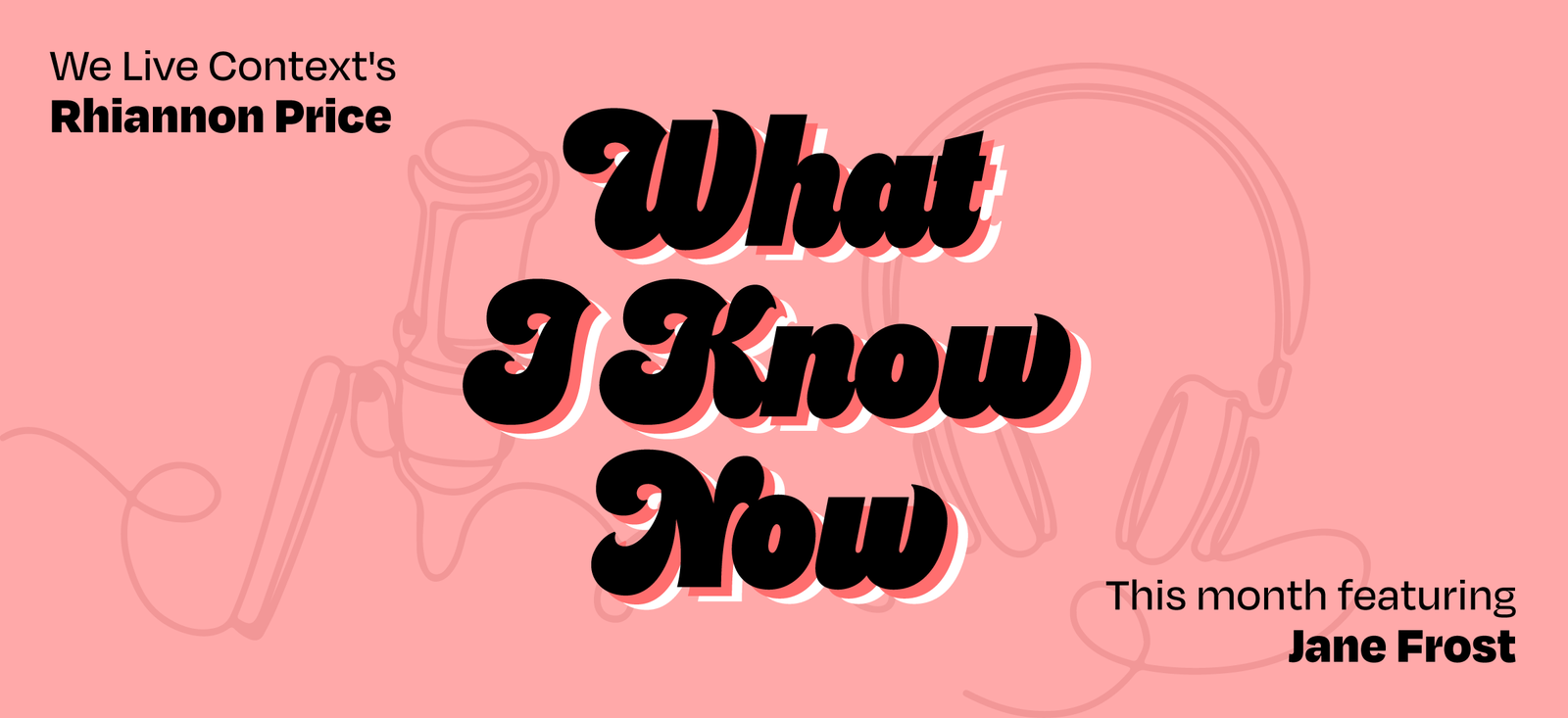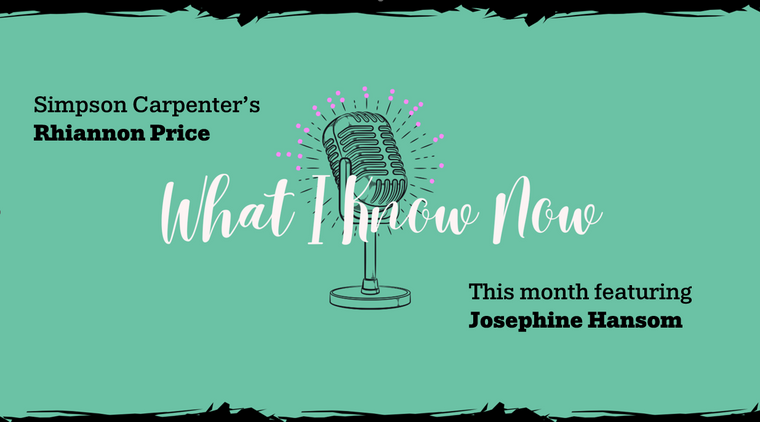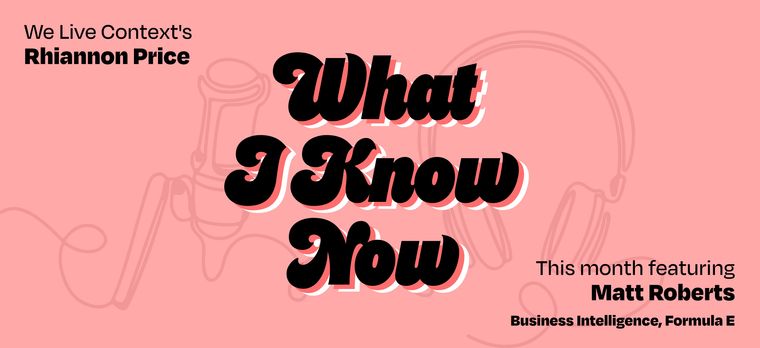What I Know Now… Jane Fost CBE
Each month, We Live Context’s Rhiannon Price asks some familiar faces in the MRX world what they have learned about themselves and the industry on their journey so far.

What I Know Now…
I’m lucky enough to have interviewed some super interesting people throughout my career. People from all over the world. People from all types of professions. People from many different backgrounds. I’ve spent days in their company taking it all in. I’ve seen them laugh, cry, and get angry about the twists and turns their path has taken them on. Be it a South African entrepreneur in Soweto or a Saudi millionaire, I have learned a lot about how people get to where they are going and their advice for life. But until recently, I have never really turned the lens inward. I have never asked my peers or the people I most admire in market research what their advice for life is. How they got to where they are. How they see things. But when I did, I found it wonderfully inspiring and not only a little bit transformative.
And so, I thought it was about time that we celebrated the wisdom of our MRX crowd and let their stories inspire us. This month I spoke to Jane Frost CBE - CEO of the MRS who shared her experiences of leadership in a man’s world, self-doubt, staying curious and the importance of two small words.
Let’s start like we mean to go on with the “big one at one”…Are you where you thought you would be at this point?
When I was 11, I wanted to be an Egyptologist. I love archaeology - it's just fascinating. It's a bit like research - you get all these insights from which you have to create a story. And I suppose, had I been gifted and dedicated, I might have ended up in academia somehow, but I'm not gifted, or particularly dedicated in that sense. So, one of the pieces of advice my father gave me was, “why don't you go out and make money and then go and see all these things?” And that is when I joined my first company, which was Unilever. They had something called “World Co-ordinator “ which I thought would be a cool role, unfortunately, they re-organised it out of existence before I left middle management . But I did always want to lead.
Why was being a leader so important to you?
I had very little control in many ways in my career because as a woman, in a very male environment (I'm not a researcher, I'm a marketer), there were days where there wouldn't be another woman in the room. So, I wanted to be in a place where people had to listen to me for two reasons. 1) I could change things. And 2) I felt empowered. And it's the changing things that's most important. Because that gives you the immense privilege of meeting and helping other people…and there's a joy in meeting new people all the time. Which is why I'm so passionate about EDI as well, because how sad is a ‘me too’ world?
How far do you think we have come in terms of senior women not being the only woman in the room?
A huge amount of the way, but from a low benchmark in the sense that my generation of women coming into the industry were subjected to some of the most horrific predatory behaviour, and I was sacked for being pregnant, which was (and still is) illegal. Some of it was hilariously funny now I can look back on it. Like my door had to have ‘Mrs’ written on it to warn people there was a woman in there. What did they think I would do? Launch an attack from the filing cabinet? Or when I first made the C-suite, most of the women's toilets were two floors down – some key ethnographic clues to how women were viewed in the organisation! I don't think feminism has won yet, we're still subject to this stuff.
Having just come back from maternity leave, ‘Imposter Syndrome’ is something a lot of returning mums I speak to suffer from. Do you ever fight self-doubt and what do you do to silence the inner critic?
When I finally got myself a coach, I said to him, one of the reasons I need you is because I'm questioning myself, I feel deeply insecure. And he said, “You don't come over as deeply insecure”. I think senior leaders saying that insecurity is a thing is not a bad idea – as it makes you question how you do things. But I've always been put in a position where if I fail, marketing fails, and women fail, because it's always been an experiment a to have a marketer and be a woman. For example, Shell in the Middle East, can you imagine?
You've been at the helm of the MRS for a long while now, and you've made some great progress and changes. Including EDI. Do you have any insight on how to navigate what is - rightly or wrongly - quite an intimidating area for some people?
I think it's always wise to remember what the outcome is you're looking for, not the output. And that's why we don't write 30 pages of targets down, because it is different for everyone. We just want you to be on a journey where you know where you are going to emerge, and committed to taking small left turns along the way. There's a lot of stuff to learn in how to be better, and some of that can be quite complex, because we're dealing with people, they're very complex things.
I turned up to launch MRS Pride. I’d already asked why they wanted me as I’m not from the community, but they said it's really important to see the CEO saying this is where we want to be. But then I got beaten up on a webinar because I said, apparently, the wrong thing. I still don't know what I said. But, it’s about standing up there and trying.
Being awarded a CBE was a huge achievement for you – what did it mean to you and thinking back to your younger self, has the meaning of achievement and how it feels changed?
The CBE was marvellous, because I'd never would have expected it. And it was probably the first time I felt anyone wanted to say ‘thank you’. I think the best thing you can do for anyone is not anything complicated, but just notice them. In terms of achievement, I think we all feel we've never achieved enough. I'm well aware I've done things that look good, but on the other hand, I can't sing or draw. I would love to be able to contribute in something other than what I contribute. So my substitute is all the charity work I do. But I don't think you are ever too satisfied with what you've done, and that's probably a good thing.
Has there ever been a time when you’ve thought you might have made the wrong decision in your career?
There are things I regret. I don't regret it enough to say “would I have changed it?” I mean, yes, I would have taken more time out, I would actually have taken my holiday. I think it would have served me to be more selfish, because I never wanted to give anything up until all the people around me were safe, and that was probably bad for my mental health. But no, I've had an amazing career. I've loved everything that I've done. Everything has taught me something. I've met some wonderful people. I've been blooming lucky!
Is there one piece of advice you live by?
There are several things I live by, but I think you start by staying curious. The motto on our family crest is Stay Curious, which was chosen by the children, because they said that's what I taught them to do. If you're not curious, you're not aware. And if you're not aware, then you don't notice what other people are doing around you and what's going on.
What’s the one thing you do as a personal habit of practise that keeps you going?
I think if there is a God, he’s the God of small things – there is so much joy to be found in small things. The 3 year old who wants to hold your hand, the joy of the welcome from your dog, birdsong in the back garden, the single cyclamen flowering in the woods. So, when it’s tough. I go outside, take a deep breath, look for something joyous and small - and say thank you.
And to end on some quick fire recommendations for personal and professional development…
If you read just one book…?
I’m not much into self-help or books – although I do find the HBR very useful. But ‘Winnie the Pooh’ is something I recommend for all stages of life. All types of management are encapsulated in those characters – for example, beware the Tigger manager; he bounces you up a tree, but can’t help you get down. And ‘1066 And All That’ provides great tests of your thinking, such as: “Are you making this task difficult by writing on both sides of the paper at once”? Humour works better for me, not just to learn but to remember.
If you listen to just one podcast…?
The Guardian Long read or almost anything from Radio 4 – you need to keep feeding a curious mind.
If you follow just one person…?
In a similar vein: John Crace, the Guardian sketch writer; Ben Page at Ipsos; and Paul Polman on the environment.
If you remember just one thing…?
Laugh and the world laughs with you. It’s much easier to get things done through good humour. I know there is much to rage about, but overbearing rage doesn’t bring many people with you.


